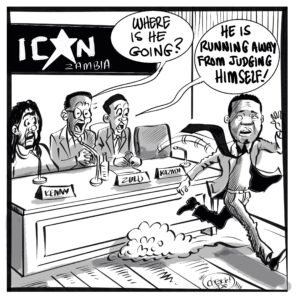Government must allow mining companies to import their own power by issuing a required license to help cushion the country’s ongoing power deficit, says the Zambia Chamber of Mines.
And the Chamber has expressed disappointment that Finance Minister Dr Bwalya Ng’andu did not make any changes to the 2019 mining fiscal regime.
Last week, Liuwa UPND member of parliament Dr Situmbeko Musokotwane urged Zesco to allow the mines import their own power in order to cushion the country’s power deficit.
“Also, I want to tell you that my committee in Parliament, there was a time when we visited the mines, they told me that ‘if we are permitted by Zesco, we can import our own electricity, the only thing Zesco needs to do is to allow us to move that electricity on their pylons, but we can make our own arrangements to import electricity’, whether it’s from South Africa, Congo, I don’t know. In my view, they should be allowed to do so because if they are allowed to import electricity, it means that, of course, they will pay so government doesn’t need to subsidize, but, of course, it means that there will be slightly more electricity that will be available for other people, but for now, the mines, you and me are struggling to get a portion of what Zesco gives us. So, if somebody offers and says ‘don’t worry about me, I can make my own arrangements,’ why should you stop them? So, in the short-term, I think it’s important for the mines to be allowed to import electricity so that the rest of us can have more,” urged Dr Msokotwane.
And in an interview, Chamber of Mines president Goodwell Mateyo urged government to allow mining companies to start importing their own power to help cushion the country’s power deficit, which still remains at an estimated 400MW after South Africa’s Eskom commenced its imports of 300MW from this month.
Mateyo noted that the only challenge, which currently hampered the mines from importing their own power, was a license by the Ministry of Energy.
“I think the challenge is that the Ministry must sanction or license any power imports so the constraints would lie with the Ministry of Energy. But I do know that there were some efforts in the past for some of the mines to try and import power, but they were not allowed to. I think it’s an option that the Ministry must leave open and available to the mines,” said Mateyo.
And the Chamber expressed disappointment that Dr Ng’andu did not make any changes to the disputed 2019 mining fiscal regime, which raised mineral royalties by 1.5 percentage points across all levels of the sliding scale, among other punitive measures.
Chamber chief executive officer Sokwani Chilembo stated that while government deserved commendation for scrapping the Goods and Services Tax (GST), he complained that the 2019 mining fiscal regime still remained in place.
According to the Chamber, the 2020 budget had not only failed to give respite from the tax burden, it has added to it because the effect of additional tax measures will be to increase the cost of capital equipment by 10 per cent, and the cost of consumables, such as spare parts, by 16 per cent.
“Following this budget, and the impact that it will have on the cost profile of Zambia’s mines, we maintain our prediction of a 100,000-tonne reduction in copper production for this year, with a further commensurate drop in 2020. Now that KCM is effectively in State hands, the government will have first-hand experience of the costs pressure the sector is under. They can, therefore, act on what they are seeing, not just what we are telling them. We hope they do so before irreparable damage is caused,” stated Chilembo in a statement released, Monday.
























